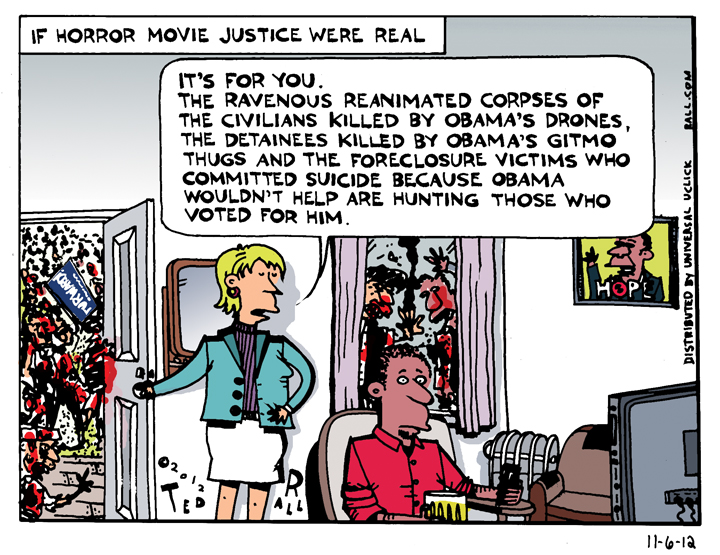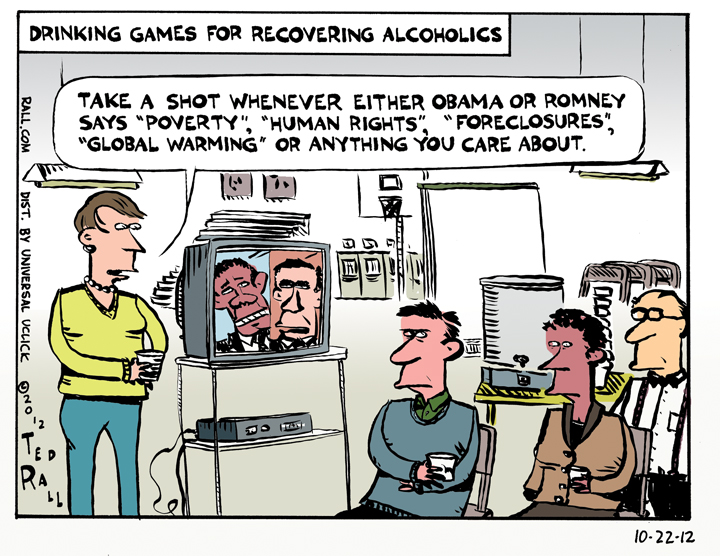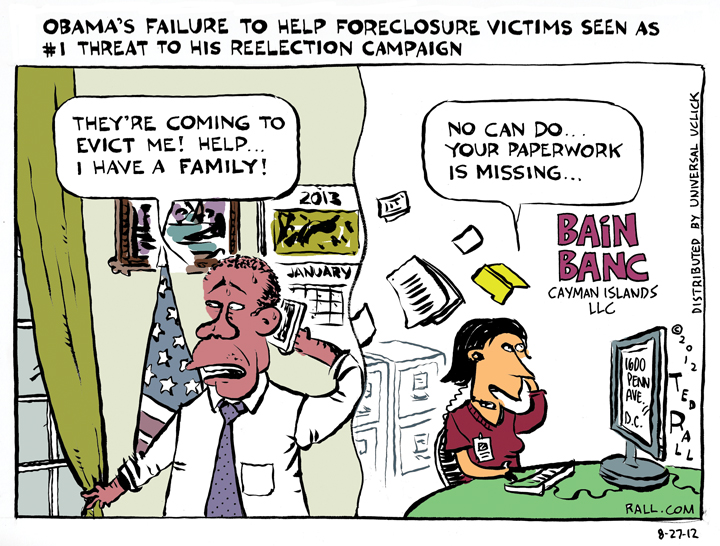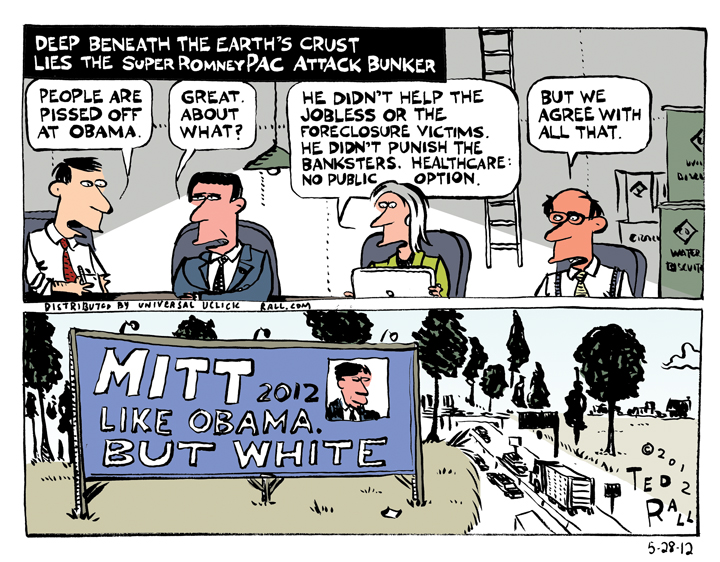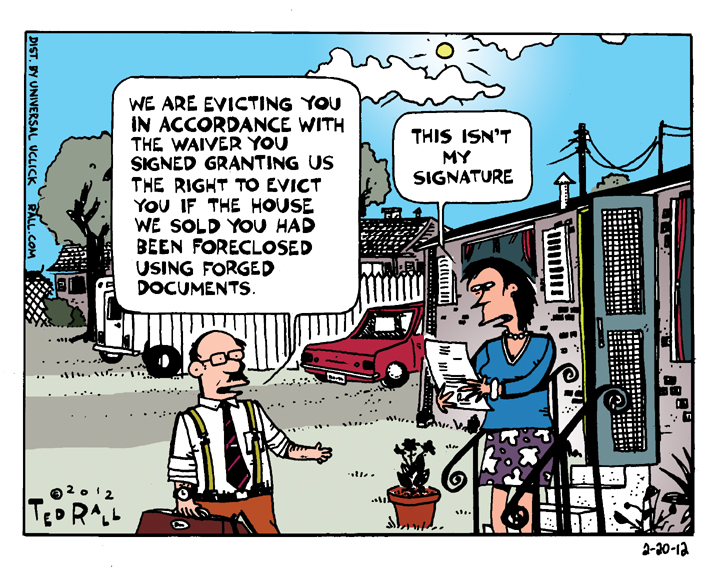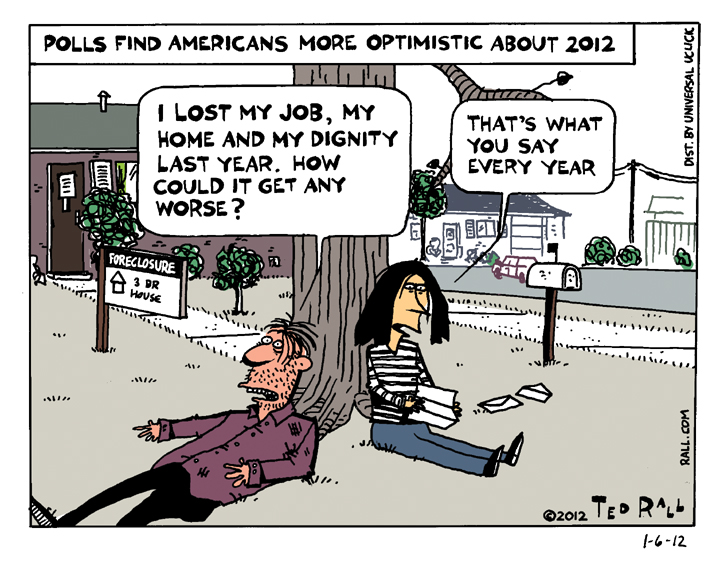What if horror movies were real? Perhaps the people who are voting for Obama despite his murderous drone policies, endorsement of torture of Bradley Manning and others, post-foreclosure suicides, etc. would be faces with a terrible vengeance.
SYNDICATED COLUMN: If You Vote, You Can’t Complain
Why It’s OK for Disgusted Liberals Not to Vote for Obama
Here we go again. Like Charlie Brown considering Lucy’s offer to hold the football so he can kick it–and Lucy’s promises not to pull it away at the last second, as she’s done every time in the past–lefties are being urged to set aside their disgust over the last four years and vote Democratic.
At least Lucy respected Charlie Brown enough to lie to him. President Obama isn’t even bothering to tell disappointed progressive voters that things will be different this time. At last night’s second presidential debate, for example, he promised to create jobs years in the future–not now, when we need them.
Despite my well-documented doubts, I voted for Obama in 2008. Not this time.
“If you don’t vote for Obama, you’re letting Romney win.” (So many friends, colleagues, family members, correspondents, bloggers and random whoevers have told me that that it hardly seems fair to single one out for attribution.)
Nonsense!
No election in the U.S. has ever been decided by one vote. None.
Thus, by definition, my vote is purely symbolic. (Don’t give me that “if everyone thinks the same way…” garbage. If everyone bought my book, it would be a #1 bestseller. If everyone used trashcans, there wouldn’t be litter. If everyone…if if if. The only vote you control, the only action you can take, is your own.)
My vote has no value other than as a symbolic endorsement. And I refuse to endorse what this president has done and failed to do.
I won’t symbolically endorse his drone war, which has killed thousands of Pakistanis–98% of them innocent civilians, the other 2% political dissidents with no designs against the U.S.
I will not endorse Obama’s 2009 decision to hand $7.77 trillion–$24,000 for every man, woman and child in the country–to bankers, no strings attached, who ought to be in prison while consciously standing by and allowing millions of homeowners to fall victim to illegal foreclosures and failing to abolish the time limit for unemployment benefits, as is standard in other countries.
Obama can go golfing more than 100 times while prisoners the Pentagon has declared innocent continue to rot in Gitmo dog cages. I can’t stop his war crimes. But he can commit them without my tacit silence-equals-death consent, much less my voluntary endorsement.
I could write a book.
The comedian George Carlin said: “People say, ‘If you don’t vote, you have no right to complain,’ but where’s the logic in that? If you vote and you elect dishonest, incompetent people into office who screw everything up, you are responsible for what they have done. You caused the problem; you voted them in; you have no right to complain. I, on the other hand, who did not vote, who in fact did not even leave the house on election day, am in no way responsible for what these people have done and have every right to complain about the mess you created that I had nothing to do with.”
If you’re like me, you think Mitt Romney would be even worse than Obama. What should you do? Whatever you want.
I don’t care if you vote for Obama, or for a third-party candidate like Jill Stein of the Greens, or if you don’t vote at all. Do whatever you want, but don’t think about it. Electoral politics is a distraction.
You should be spending your time and energy thinking about revolution.
Between now and the dictatorship of the proletariat, however, we have to fend off a lot of stupid pro-Democrat entreaties to forget the dead Pakistanis and the desperate poor and your own bank balance and endorse the man and the administration who made them possible. To help you refute your pseudo-liberal, Obama-loving, Democratic apologist friends, here are some powerful counterarguments to their lesser-evilism.
Argument 1: If you don’t vote for Obama, Romney will win.
Your response: Bull. That might be true if you live in a swing state. (If you’re one of the three out of four Americans who don’t live in a swing state, stop reading here.) A 2010 study found that zero out of 20,000 elections–including for Congress and Senate–has ever come down to one vote. The closest margin, for one race in 1910, was six votes. Feel free to stay home. Hell, vote for Romney. Won’t make any difference.
Argument 2: Obama will be more liberal in a second term.
Your response: How do you know? Not having learned anything from the last four years, Obama still says he’ll be “more than happy to work with Republicans” after the election (to help them dismantle Medicare). Let’s take the man at his lack of word: he hasn’t promised much. Even if we stipulate Obama’s secret, silent liberal intentions, how will he push them through House that will likely remain Republican? Not to mention, lame duck presidencies aren’t renowned for their record of legislative achievement. Obama will have as much chance of signing big new programs into law sitting in his kitchen in Chicago as in the Oval Office.
Argument 3: Romney will push the country even further to the Right.
Your response: The U.S. has moved to the right since the early 1970s. But it wasn’t just because of Reagan and Bush Jr. Presidents Carter, Clinton and yes, Obama also moved the needle to the right. Their most important actions were pro-Republican: Carter’s pre-Reagan defense build-up and arming the Afghan Islamists, Clinton’s gutting of welfare and hollowing out of American manufacturing with “free trade” deals, Obama’s expansive drone wars and bank bailouts, which increased the chasm between the rich and the poor. They ridiculed, marginalized and silenced liberals and progressives within the Democratic Party. Most of all, they didn’t hold the line against GOP ideas, rarely resorting to filibusters and frequently going along with conservative initiatives.
Whether Romney or Obama wins, the Right will continue to get their way. That’s how the system works.
Don’t forget the ironic only-Nixon-could-go-to-China phenomenon: Democratic presidents sometimes go further right than Republicans can. If George W. Bush were still president, he would have taken a lot more heat from the left than Obama has. It’s easy to imagine him being forced to, for example, extend unemployment benefits indefinitely–something Obama hasn’t even tried–to avoid a revolutionary uprising.
In the short run, it makes sense for liberals to vote Democratic. In the long run, voting for conservative Democrats costs libs their leverage. During times of crisis, like now, short-term and long-term considerations intersect. This is not a time to vote same-old, same-old–or to think that voting matters.
(Ted Rall‘s latest book is “The Book of Obama: How We Went From Hope and Change to the Age of Revolt.” His website is tedrall.com.)
COPYRIGHT 2012 TED RALL
SYNDICATED COLUMN: The Rebranding of the President, 2012
Why Is Obama Running on His Record?
“It’s not clear what [President Obama] is passionate to do if he is elected for another four years,” writes David Brooks, conservative columnist for The New York Times. “The Democratic convention is his best chance to offer an elevator speech, to define America’s most pressing challenge and how he plans to address it.”
Addressing the DNC Wednesday night, Bill Clinton came as close as any Democrat has this year to answering Brooks: “In Tampa, the Republican argument against the president’s reelection was pretty simple: We left him a total mess, he hasn’t finished cleaning it up yet, so fire him and put us back in. I like the argument for President Obama’s reelection a lot better.”
Nicely done—though this argument only works for voters stuck in the two-party trap. But the biggest piece is still MIA: Obama’s domestic and foreign policy agenda for a second term.
Two principal arguments are being advanced in favor of Obama’s reelection: first, that he “took out” Osama bin Laden; second, that we are “absolutely” better off economically than we were four years ago. These arguments, if they continue to be the Democrats’ main talking points, will lead Obama to defeat this fall.
U.S. history shows that the candidate who presents the most optimistic vision of the future usually prevails. The future he sells doesn’t have to be specific (Romney’s 12 million new jobs, say). Ronald Reagan, who projected vague aw-shucks optimism reflected by a 100%-pabulum campaign slogan, “It’s Morning in America,” defeated Jimmy “Malaise” Carter and Walter “Let’s Tell the Truth About Taxes” Mondale. (Never mind that Carter and Mondale were more honest, smarter and nicer.)
Obama followed the Reagan model in 2008: hope, change, charming smile, not a lot of specifics. And it worked. (It didn’t hurt to run against McCain, the consummate “get off my lawn, you damn kids” grouch.) So why is Obama trading in a proven winner? Why is he running on his first-term record?
Obama’s entourage has obviously talked themselves into believing that the president’s record is better than it really is—certainly better than average voters think it is. Grade inflation is inevitable when you evaluate yourself. (In 2009, at the same time the Fed was greasing the banksters with $7.77 trillion of our money—without a dime devoted to a new WPA-style jobs program—he gave himself a B+.)
First, the extrajudicial assassination of bin Laden, an act of vengeance against a man in hiding who had been officially designated to pose no threat since at least 2006, makes some people queasy. Sure, many voters are happy—but getting even for crimes committed more than a decade ago still doesn’t spell out an optimistic vision for the future.
Similarly, and perhaps more potently since jobs are the most important issue to Americans, claiming that we are better off than we were four years ago, either personally, or nationally, is a dangerous argument for this president to make. Four years ago marks the beginning of a financial crisis that continues today. GDP remains a low 1.7%. Credit remains so tight that it’s still strangling spending.
Four million families lost their homes to foreclosure, millions more were evicted due to nonpayment of rent, and a net 8 million lost their jobs under Obama. Structural unemployment is rising. New jobs are few and pay little.
Most Americans—by a nearly two-to-one margin—feel worse off now than they did four years ago. Coupled with the media’s ludicrous claim that the recovery began in mid-2009, Obama’s “who are you going to believe, me or your lying eyes” (or pocketbook) sales pitch is so insulting and reminiscent of George H.W. Bush’s tone-deaf attitude during the 1992 recession that it can only prove counterproductive.
The historical lesson for Obama is 1936. Franklin Roosevelt is the only president in recent history to have won reelection with unemployment over 8%, as it is currently (it was 17%). Why? FDR’s New Deal showed he was trying hard. And things were moving in the right direction (unemployment was 22% when he took office). Fairly or not, Obama can’t beat Romney pointing to improvement statistics don’t show and people don’t feel.
Obama must articulate a new vision, relaunching and rebranding himself into something completely different—in other words, running as though the last three four years had never happened. Like this was his first term.
New image. New ideas. New policies. New campaign slogan.
Not only does Obama need to float big new ideas, he needs to convince voters that he can get them through a GOP Congress. Not an easy task—but there’s no other way.
It isn’t enough to simply say that Romney will make things worse. Lesser-evil arguments are secondary at best. As things stand now, with people angry and disappointed at government inaction on the economy, Romney’s “Believe in America” meme—though stupid—is more potent than Obama’s reliance on fear of a Ryan budget.
(Ted Rall’s new book is “The Book of Obama: How We Went From Hope and Change to the Age of Revolt.” His website is tedrall.com. This column originally appeared at NBCNews.com’s Lean Forward blog.)
COPYRIGHT 2012 TED RALL
Help!
Obama tried to finesse his response to the housing crash, rejecting a bailout of homeowners facing foreclosure in favor of a limited aid program and a bet that a recovering economy would take care of the rest. Millions of people lost their homes and the recovery never materialized. The economy is now the primary threat to Mr. Obamaâs bid for a second term, and economists and political allies say the Obama’s non-response to the housing crisis was the administrationâs most significant mistake.
SYNDICATED COLUMN: Lead, or Follow and Get Out of the Race
Voters Turn Against Pols’ Follow-the-Polls Strategy
In order to be a good leader, Disraeli said, “I must follow the people.”
Aided and abetted by toe-sucking pollster Dick Morris, Bill Clinton finessed the art of leading from the rear, relying on Morris’ tracking surveys to help him decide everything from whether to bomb Serbia to when and if to take a vacation.
By definition, however, leaders point where their followers should go. Americans haven’t seen much real leadership on the federal level since Reagan. Where there’s been progress, such as on gay rights, the President only stepped forward after public opinion had shifted enough to make it safe.
For the first time in 30 years, Dick Morris’ follow-the-voters strategy appears to be running out of steam. This year, the electorate seems to be hungering for presidents in the mold of TR, FDR and LBJ—old-school leaders who painted ambitious visions of where America could go and why it should, who took political gambles that the people might not be ready for what they had in mind, who anticipated crises and challenges before anyone else, and explained why we had to act sooner rather than later.
The craving for leadership is evident in the polls. Though personally popular and enjoying the advantages of incumbency, President Obama is running neck and neck against Mitt Romney, an awkward candidate from a minority religion who has trouble connecting with, and is seen as out of touch by, ordinary voters.
Democrats must be worried. Historically, Republican presidential nominees typically gain on Democrats throughout the fall. At this point in the game, Democrats need a substantial lead in order to emerge victorious in November.
What’s going wrong? Mainly, it’s the economy. It sucks. Still. Democrats say the President inherited the meltdown from Bush. But Americans blame Obama.
“The nation’s painfully slow pace of growth is now the primary threat to Mr. Obama’s bid for a second term, and some economists and political allies say the cautious response to the housing crisis was the administration’s most significant mistake,” reports The New York Times. Obama’s big screw-up: “He tried to finesse the cleanup of the housing crash, rejecting unpopular proposals for a broad bailout of homeowners facing foreclosure in favor of a limited aid program—and a bet that a recovering economy would take care of the rest.”
Recovery? What recovery?
The depressed housing market, coupled with the reduced purchasing power of tens of millions of Americans who lost their homes to eviction and/or foreclosure, makes recovery unlikely to impossible for the foreseeable future.
Many people, including yours truly, warned that the millions of Americans who were evicted under foreclosure, many of them illegally, were more “too big to fail” than Citigroup. Some, like former Congressman Jim Marshall (D-GA), voted for TARP, but urged the Obama Administration to condition the bailout on forcing the banks to refinance mortgages and write down principal to reflect the new reality of lower housing prices. “There was another way to deal with this, and that is what I supported: forcing the banks to deal with this. It would have been better for the economy and lots of different neighborhoods and people owning houses in those neighborhoods,” Marshall says.
Voters aren’t mad at Obama for not being clairvoyant. They’re pissed off because he ignored people who were smart and prescient in favor of those who were clueless and self-interested, like Tim Geitner. He may be about to pay a price for that terrible decision.
Tens of millions of Americans already have.
Speaking of leadership—the art of seeing what comes next and doing something about it—what looming problems are the political class ignoring today?
It’s too late to stop the 2008-to-2012 economic meltdown. But it’s still possible for Obama (or, theoretically, Romney) to get ahead of the economy—permanent unemployment benefits, anybody?—and other pressing issues.
Australia, for example, is taking the climate change crisis seriously.
Americans want leaders who point the way forward, to anticipate monsters we can’t yet imagine. For example, there is a huge looming crisis: pensions. In 10 to 15 years, Generation Xers will hit traditional retirement age. How will they eat?
Close to none have traditional defined-benefit pension plans. Gen Xers, who earn far less than the Baby Boomers at the same age, have been shunted into 401(k)s, which turned out to be a total ripoff: the average rate of return between 1999 and 2010 was 0.3 percent.
Total.
And much of that was withdrawn—under penalty—to subsist after layoffs.
“[Gen Xers] have no savings, and what they had was devastated by two market crashes,” said Andrew Eschtruth of the Center for Retirement Research. “They never got off the ground.”
If you’re 45 years old now and just beginning to save for retirement, financial planners say you should save 41 percent of your income annually (if you haven’t gotten laid off again). As if. Half of Gen Xers live hand to mouth; the rest save a piddling six percent a year.
The Gen X retirement crisis represents 46 million people waiting for a savior—and 46 million potential votes.
Attention Mssrs. Obama, Romney and anyone else presenting yourself as a would-be leader: Don’t just read the polls. Don’t follow us. Show that you care about, and have a credible plan to confront, the problems of the future. If you do that—and we’re not holding our breaths—we’ll pay attention to you.
(Ted Rall’s new book is “The Book of Obama: How We Went From Hope and Change to the Age of Revolt.” His website is tedrall.com. This column originally appeared at NBCNews.com’s Lean Forward blog.)
COPYRIGHT 2012 TED RALL
SYNDICATED COLUMN: Another Obama Sellout
Mortgage Settlement a Sad Joke
Joe Nocera, the columnist currently challenging Tom Friedman for the title of Hackiest Militant Centrist Hack—it’s a tough job that just about everyone on The New York Times op-ed page has to do—loves the robo-signing settlement announced last week between the Obama Administration, 49 states and the five biggest mortgage banks. “Two cheers!” shouts Nocera.
Too busy to follow the news? Read Nocera. If he likes something, it’s probably stupid, evil, or both.
As penance for their sins—securitizing fraudulent mortgages, using forged deeds to foreclose on millions of Americans and oh, yeah, borking the entire world economy—Ally Financial, Bank of America, Citibank, JPMorgan Chase and Wells Fargo have agreed to fork over $5 billion in cash. Under the terms of the new agreement they’re supposed to reduce the principal of loans to homeowners who are “underwater” on their mortgages—i.e. they owe more than their house is worth—by $17 billion.
Some homeowners will qualify for $3 billion in interest refinancing, something the banks have resisted since the ongoing depression began in late 2008.
What about those who got kicked out of their homes illegally? They split a pool of $1.5 billion.
Sounds impressive. It’s not. Mark Zuckerberg is worth $45 billion.
“That probably nets out to less than $2,000 a person,” notes The Times. “There’s no doubt that the banks are happy with this deal. You would be, too, if your bill for lying to courts and end-running the law came to less than $2,000 per loan file.”
Readers will recall that I paid more than that for a speeding ticket. 68 in a 55.
This is the latest sellout by a corrupt system that would rather line the pockets of felonious bankers than put them where they belong: prison.
Remember TARP, the initial bailout? Democrats and Republicans, George W. Bush and Barack Obama agreed to dole out $700 billion in public—plus $7.7 trillion funneled secretly through the Fed—to the big banks so they could “increase their lending in order to loosen credit markets,” in the words of Senator Olympia Snowe, a Maine Republican.
Never happened.
Three years after TARP “tight home loan credit is affecting everything from home sales to household finances,” USA Today reported. “Many borrowers are struggling to qualify for loans to buy homes…Those who can get loans need higher credit scores and bigger down payments than they would have in recent years. They face more demands to prove their incomes, verify assets, show steady employment and explain things such as new credit cards and small bank account deposits. Even then, they may not qualify for the lowest interest rates.”
Financial experts aren’t surprised. TARP was a no-strings-attached deal devoid of any requirement that banks increase lending. You can hardly blame the bankers for taking advantage. They used the cash—money that might have been used to help distressed homeowners—to grow income on their overnight “float” and issue record raises to their CEOs.
Next came Obama’s “Home Affordable Modification Program” farce. Another toothless “voluntary” program, HAMP asked banks to do the same things they’ve just agreed to under the robo-signing settlement: allow homeowners who are struggling to refinance and possibly reduce their principals to reflect the collapse of housing prices in most markets.
Voluntary = worthless.
CNN reported on January 24th: “The HAMP program, which was designed to lower troubled borrowers’ mortgage rates to no more than 31% of their monthly income, ran into problems almost immediately. Many lenders lost documents, and many borrowers didn’t qualify. Three years later, it has helped a scant 910,000 homeowners—a far cry from the promised 4 million.”
Or the 15 million who needed help.
As usual, state-controlled media is too kind. Banks didn’t “lose” documents. They threw them away.
One hopes they recycled.
I wrote about my experience with HAMP: Chase Home Mortgage repeatedly asked for, received, confirmed receiving, then requested the same documents. They elevated the runaround to an art. My favorite part was how Chase wouldn’t respond to queries for a month, then request the bank statement for that month. They did this over and over. The final result: losing half my income “did not represent income loss.”
It’s simple math: in 67 percent of cases, banks make more money through foreclosure than working to keep families in their homes.
This time is different, claims the White House. “No more lost paperwork, no more excuses, no more runaround,” HUD secretary Shaun Donovan said February 9th. The new standards will “force the banks to clean up their acts.”
Don’t bet on it. The Administration promises “a robust enforcement mechanism”—i.e. an independent monitor. Such an agency, which would supervise the handling of million of distressed homeowners, won’t be able to handle the workload according to mortgage experts. Anyway, it’s not like there isn’t already a law. Law Professor Alan White of Valparaiso University notes: “Much of this [agreement] is restating obligations loan servicers already have.”
Finally, there’s the issue of fairness. “Underwater” is a scary, headline-grabbing word. But it doesn’t tell the whole story.
Tens of millions of homeowners have seen the value of their homes plummet since the housing crash. (The average home price fell from $270,000 in 2006 to $165,000 in 2011.) Those who are underwater tended not to have had much equity in their homes in the first place, having put down low downpayments. Why single them out for special assistance? Shouldn’t people who owned their homes free and clear and those who had significant equity at the beginning of crisis get as much help as those who lost less in the first place? What about renters? Why should people who were well-off enough to afford to buy a home get a payoff ahead of poor renters?
The biggest fairness issue of all, of course, is one of simple justice. If you steal someone’s house, you should go to jail. If your crimes are company policy, that company should be nationalized or forced out of business.
Your victim should get his or her house back, plus interest and penalties.
You shouldn’t pay less than a speeding ticket for stealing a house.
(Ted Rall is the author of “The Anti-American Manifesto.” His website is tedrall.com.)
COPYRIGHT 2012 TED RALL

